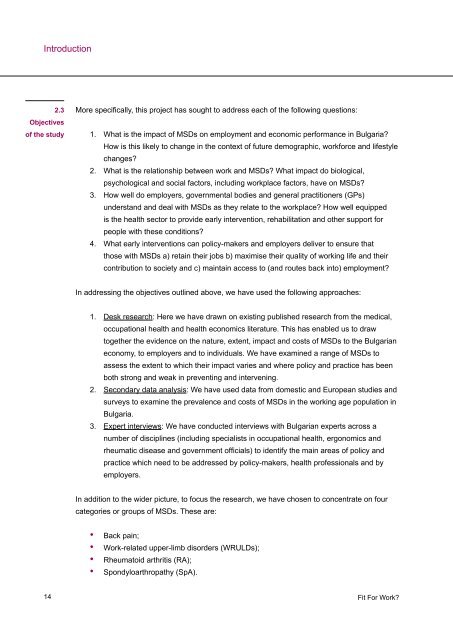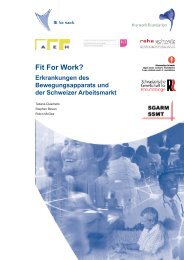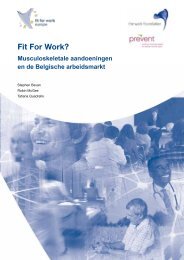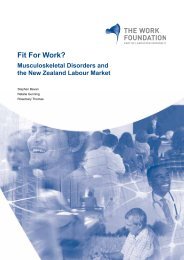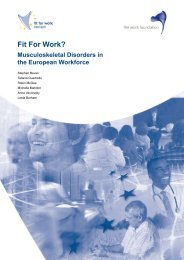FfW Bulgarian report (English language) - Fit for Work Europe
FfW Bulgarian report (English language) - Fit for Work Europe
FfW Bulgarian report (English language) - Fit for Work Europe
Create successful ePaper yourself
Turn your PDF publications into a flip-book with our unique Google optimized e-Paper software.
Introduction<br />
2.3<br />
Objectives<br />
of the study<br />
14<br />
More specifically, this project has sought to address each of the following questions:<br />
1. What is the impact of MSDs on employment and economic per<strong>for</strong>mance in Bulgaria?<br />
How is this likely to change in the context of future demographic, work<strong>for</strong>ce and lifestyle<br />
changes?<br />
2. What is the relationship between work and MSDs? What impact do biological,<br />
psychological and social factors, including workplace factors, have on MSDs?<br />
3. How well do employers, governmental bodies and general practitioners (GPs)<br />
understand and deal with MSDs as they relate to the workplace? How well equipped<br />
is the health sector to provide early intervention, rehabilitation and other support <strong>for</strong><br />
people with these conditions?<br />
4. What early interventions can policy-makers and employers deliver to ensure that<br />
those with MSDs a) retain their jobs b) maximise their quality of working life and their<br />
contribution to society and c) maintain access to (and routes back into) employment?<br />
In addressing the objectives outlined above, we have used the following approaches:<br />
1. Desk research: Here we have drawn on existing published research from the medical,<br />
occupational health and health economics literature. This has enabled us to draw<br />
together the evidence on the nature, extent, impact and costs of MSDs to the <strong>Bulgarian</strong><br />
economy, to employers and to individuals. We have examined a range of MSDs to<br />
assess the extent to which their impact varies and where policy and practice has been<br />
both strong and weak in preventing and intervening.<br />
2. Secondary data analysis: We have used data from domestic and <strong>Europe</strong>an studies and<br />
surveys to examine the prevalence and costs of MSDs in the working age population in<br />
Bulgaria.<br />
3. Expert interviews: We have conducted interviews with <strong>Bulgarian</strong> experts across a<br />
number of disciplines (including specialists in occupational health, ergonomics and<br />
rheumatic disease and government officials) to identify the main areas of policy and<br />
practice which need to be addressed by policy-makers, health professionals and by<br />
employers.<br />
In addition to the wider picture, to focus the research, we have chosen to concentrate on four<br />
categories or groups of MSDs. These are:<br />
• Back pain;<br />
• <strong>Work</strong>-related upper-limb disorders (WRULDs);<br />
• Rheumatoid arthritis (RA);<br />
• Spondyloarthropathy (SpA).<br />
<strong>Fit</strong> For <strong>Work</strong>?


